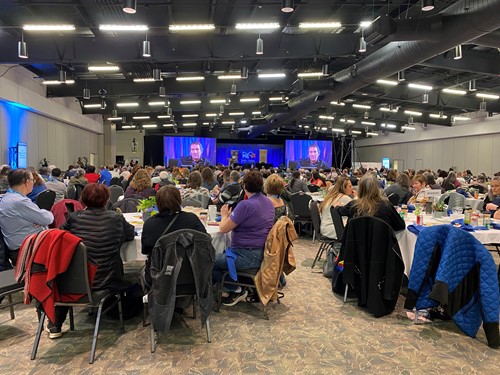Photo Caption: Behind the scenes of the Métis video production where Demi Neufeld shares her story of navigating the healthcare system after her diagnosis.
World Patient Safety Day, observed annually on September 17, highlights the importance of patient safety and reducing harm in healthcare. While many of us see healthcare settings as places where our needs are met, many also regard these settings as places where they are unwelcome and unsafe. To understand patient harm, examples must include experiences beyond just physical harm (such as falls or infections in hospitals) and encompass the full range of patient healthcare experiences.
Why patient safety in healthcare is important
Culturally unsafe care and racism cause harm through the dehumanization of patients, which can lead to further healthcare harm and even death due to neglect or malpractice. Racism and discrimination continue to thrive in our healthcare systems, by way of spaces, policies, subconscious bias on the part of providers, and denial of access to care. The ongoing impacts of colonialism, white supremacy and Indigenous-specific racism are tragically evident in the deaths of Joyce Echaquan and Brian Sinclair, and in the In Plain Sight report in BC*. First Nations, Inuit and Métis sustain cumulative and collective traumas in trying to access healthcare, including (but not limited to) the internalization of stigma and discrimination, direct stress from discriminatory interactions with care systems, and chronic hypervigilance associated with anticipations of bias and poor treatment in healthcare systems.
Achieving culturally safe care requires healthcare providers to actively and non-judgmentally listen to First Nations, Inuit and Métis patients, and facilitate patient access to cultural and traditional supports, ensuring they feel secure and respected as a person and in their identity. This holistic approach is essential for creating a healthcare system where everyone can receive truly safe and high-quality healthcare.
Distinct cultural safety needs for Métis
Métis people, one of the three distinct Indigenous groups recognized in Canada, have unique cultural safety needs that must be acknowledged and respected. But many of the resources available to help improve cultural safety in healthcare are specific to First Nations communities and experiences.
Emerging from the unions between First Nations women and European fur traders, Métis communities are a vibrant post-contact Indigenous nation with distinct language (Michif), culture and traditions. However, Métis people often face specific healthcare challenges, including language barriers, racism and discrimination, and difficulty accessing care due to rural and remote community locations and limited transportation options. Unlike status First Nations individuals, Métis people do not have access to the Non-Insured Health Benefits (NIHB) program, limiting their resources for extended health benefits and transportation to care services.
Healthcare providers often lack a comprehensive understanding of Métis history and identity, leading to assumptions and misunderstandings that adversely affect patient care. Additionally, the vision of providers is often influenced by a biased social lens that perpetuates stereotypical and inappropriate beliefs about Métis people, which negatively impact the quality of care delivered to Métis patients. Addressing these challenges through anti-racist, trauma-informed, harm-reduction, and strengths-based approaches is crucial for ensuring equitable healthcare for Métis people across Canada.
Capturing and sharing Métis experience of cultural safety
Métis Nation – Saskatchewan (MN-S) plays a vital role in representing Métis citizens in Saskatchewan and enhancing their access to culturally safe healthcare. MN-S is the sovereign Métis government that represents the rights and interests of Métis citizens living in Saskatchewan, and through its governance structure, has the authority to enact legislation, regulations, rules and resolutions governing the affairs and conduct of the Métis in Saskatchewan. MN-S offers community-based healthcare programs designed to bridge gaps, strengthen cultural safety and assist Métis patients. These initiatives include:
- Medical Travel Assistance Program
- MN-S Patient Advocate and Métis Patient Support Worker programs
- Translation services
- Connecting Métis patients to Métis Elders
- Health promotion and education resources on topics important to community
To further support cultural safety and increase awareness, MN-S developed a video series capturing the unique challenges their citizens face. In March 2023, MN-S brought together six Métis citizens to share their health stories, fostering a supportive community atmosphere. These stories capture the strength of the Métis citizens in Saskatchewan and illustrate positive healthcare experiences. Despite diverse experiences, several common themes emerged: issues with access to transportation, the burden of travel for care and a lack of understanding about Métis identity. Through this series, MN-S aims to equip healthcare providers to deliver culturally safe care and advocate for more inclusive healthcare practices.

How to provide culturally safe care for Métis
These videos serve as a crucial resource for healthcare providers striving to make care safer for Métis people. As previous Métis Patient Support Worker Terri Hansen-Gardiner shares:
“I was diagnosed with cancer years ago and that’s when I saw the Métis people struggling. They have so many challenges with cancer care […] I think it would be helpful if the hospitals had a Métis navigator. Métis patients are already scared, and they need someone to talk to them in their language to help them understand their diagnosis and what to expect.”
Other significant themes from the patients' experiences include:
- Healthcare providers should use simple and accessible language, empowering Métis patients to ask questions and be decision-makers in their own care.
- Métis-specific and Métis-led programs and services, like those provided by MN-S, are crucial for supporting Métis people in accessing care.
- Medical transportation challenges are significant for Métis people living in rural and remote communities. More transportation services for diagnosis and treatment, or providers who can travel to communities, are needed.
- Healthcare providers need more education about Métis people and the challenges, barriers and protective factors they encounter in accessing care to address the culturally unsafe care many Métis people still receive.
- Lack of access to primary care and consistent care providers leads to misdiagnosis or delayed treatment, especially for Métis in rural and remote areas.
We encourage you to listen to their stories and learn from their experiences. Marsee/maarsii – let’s continue to advance care for Métis people together.
Learn more:
- Watch the video series.
- Broaden your view of patient safety with the Rethinking Patient Safety Discussion Guide.
This blog was co-written by Métis Nation-Saskatchewan and Healthcare Excellence Canada.
*HEC recognizes that the lead author of the In Plain Sight report (‘the Report’), in its original form, is Mary Ellen Turpel-Lafond, who has been identified as someone who has falsely claimed Indigenous identity. As an organization, we recognize the significant harms caused by false claims of Indigenous identity, but respect the stories and journeys shared in this report by individuals who have experienced anti-Indigenous racism in the healthcare system. The stories and journeys of racism experienced by Indigenous Peoples of British Columbia recorded in the pages of the Report were foundational to the positive changes in British Columbia towards addressing systemic racism. HEC refers to the Report to honour these stories and journeys and build on this positive change.
